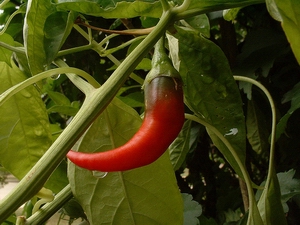 Before getting into summary reports based on actual "evidence based" double-blind placebo tests, here's an explanation of cayenne and some anecdotal empirical evidence that didn't make it to the medical journals.
Before getting into summary reports based on actual "evidence based" double-blind placebo tests, here's an explanation of cayenne and some anecdotal empirical evidence that didn't make it to the medical journals.Cayenne is usually offered as a powder from dried ground chilli peppers. Of course, chilli peppers can be consumed directly for cayenne. But the heat index is best determined with powdered cayenne.
The heat generation index for spices and hot sauces was determined by American pharmacist Wilbur Scoville in 1912, whose name was used for the index known as the Scoville Heat Units (SHU), sometimes simply termed heat units.
Many herbalists consider cayenne's medicinal effectiveness to kick in at 40,000 SHU while some think 35,000 SHU is a good start. There are 35K, 40K, 90K and 100K cayenne powder SHU levels in bulk spice sections or herbal outlets. This writer is OK with 40K.
If you'd like to try cayenne out, use organic cayenne or at least ensure what you purchase hasn't been irradiated to rob it of its medicinal potency.
Amazing cardiovascular properties of cayenne
Perhaps the most famous herbalist who promoted cayenne was the late master herbalist John Christopher, nicknamed Dr. Cayenne. After using cayenne to surprisingly cure his peptic ulcer while he was a student, he became consumed with cayenne's other benefits, which included enhancing other herbs efficacy safely.
He discovered cayenne was a panacea for cardiovascular issues, even for stopping heart attacks. Paradoxically, while reducing blood pressure and naturally thinning thick blood, cayenne powder also stops internal hemorrhaging and external bleeding from wounds.
Dr. Christopher claimed he had rescued several patients from the throes of devastating heart attacks with cayenne.
Here's an exciting anecdote - a 90-year-old man was unconscious from a heart attack. His daughter kept force feeding him a strong cayenne tincture in the ambulance. But the time they arrived, he was fully conscious and talking about finishing the lawn he had started mowing. The doctor at the hospital was amazed.
Combining a daily routine of ingesting cayenne powder or tincture and Hawthorne berry is probably the least expensive yet highly effective approach for supporting cardiovascular health.
Seven-plus cayenne study summaries
(1) Dyspepsia relief (upper abdominal discomfort or indigestion): Thirty subjects who commonly experienced symptoms of dyspepsia including bloating and gas were fed 2.5 grams of cayenne daily with meals for five weeks.
After three weeks, their dyspepsia symptoms subsided significantly and remained that way the full five weeks. Cayenne also protects the stomach from aspirin or other over-the-counter (OTC) pain relievers.
(2) Reduces serum lipoprotein oxidation: Oxidized liproteins are considered major factors for atherosclerosis (clogged arteries) and diabetes. Oxidized lipoproteins usually occur from consuming too many oxidized lipids in processed or hydrolyzed oils and margarine, both ubiquitous in the standard American diet (SAD).
A clinical study using chopped cayenne chilli peppers in the daily diet of 27 subjects determined that consuming cayenne for a period of four weeks exerts antioxidant effects, perhaps by increasing serum lipoprotein resistance to oxidation.
(3) Angina relief: Angina is chest pain caused by cardiovascular or heart problems. Cayenne has natural vasodilatory (blood vessel dilating) properties that go to the heart of angina issues.
(4) Treating diabetes 2:The active substance found in capsicum that delivers its hot and spicy flavor is capsaicin, cayenne's active ingredient.
A study found that 5 grams of capsaicin from capsicum encouraged a better maintenance of insulin levels and created a reduction in blood glucose levels. They researchers concluded that cayenne may have clinical implications in the management of type 2 diabetes.
(5) Relieves skin irritation, itching and pain: Some amputee cases have been treated with topical applications to their stumps and experienced pain relief. Research has determined that cayenne skin creams, which are available without prescription OTC, are helpful for relieving psoriasis.
Topical cayenne creams have also been useful for joint pain, painful neuropathy symptoms, herpes zoster (shingles), fibromyalgia, and post surgical nerve pain.
(6) Idiopathic rhinitis: Rhinitis refers to nasal infections; idiopathic means of unknown origin. There are nasal sprays containing cayenne that have proven to be very effective for rhinitis of unknown origins.
(7) Oral mucositis: This is a common side effect of chemotherapy or radiation, causing even more discomfort of cancer patients who submit to mainstream oncology's cut, burn, and poison treatments.
Oral mucositis is an inflammation of the mucosal lining in the mouth that creates lesions and makes speaking and swallowing difficult, sometimes even impossible.
A Yale study fed 11 oral mucositis patients taffy candy laced with capsaicin, cayenne's active ingredient. The taffy ensured maximum capsacian exposure in the mouth. All 11 experienced reduced pain; two of them had their pain completely disappear.





